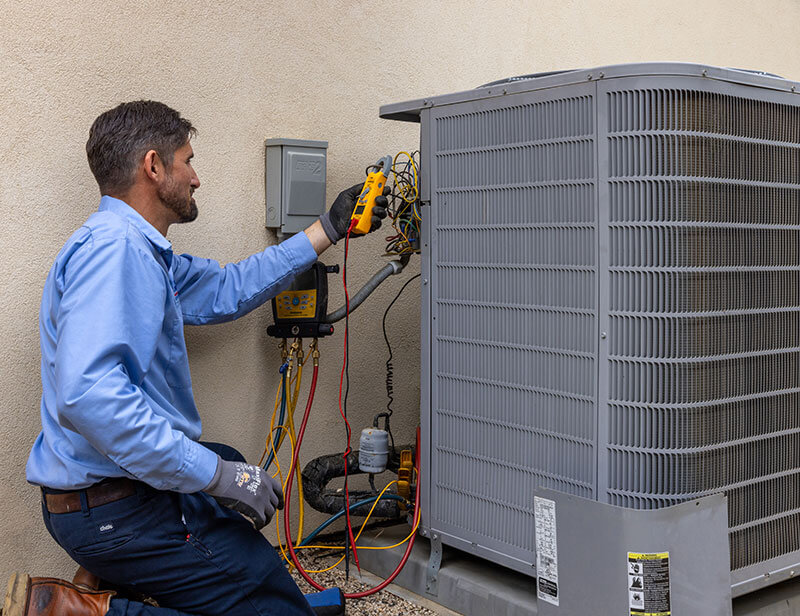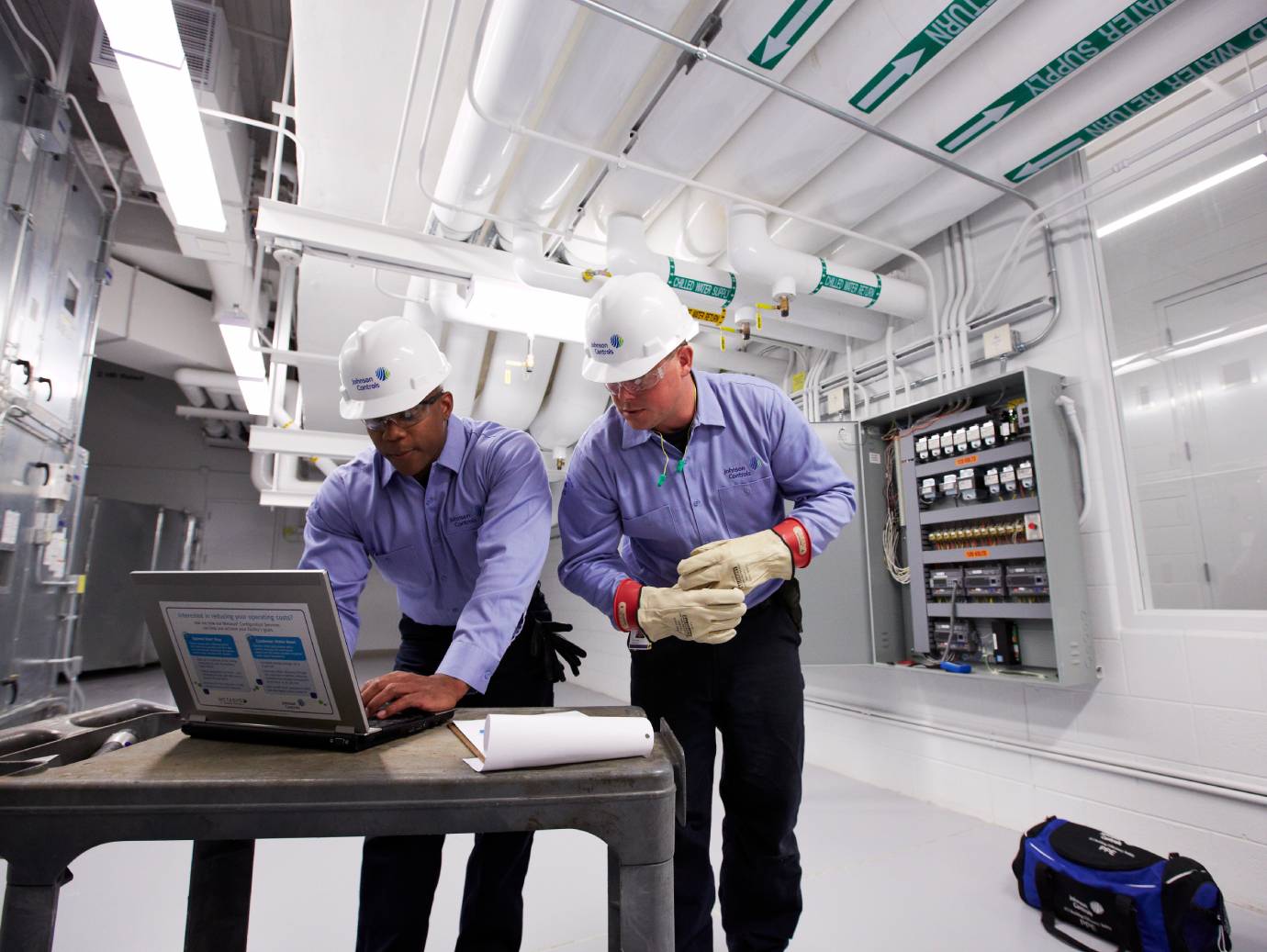Picking In Between a Warmth Pump and Heater: Trick Considerations for Your HVAC Needs
When assessing home heating alternatives for a/c needs, the choice in between a heatpump and a furnace can be complicated. Each system provides unique benefits customized to certain environments and power effectiveness objectives. Recognizing these distinctions is important for making an informed choice. Key elements such as installment costs and ecological effect even more complicate the choice procedure. Which alternative truly straightens with one's convenience and sustainability preferences? The complying with areas will discover these considerations carefully.
Recognizing Heat Pumps: How They Work and Their Benefits
While numerous property owners think about various home heating choices, understanding exactly how warm pumps function and their advantages can significantly influence their decision. Warm pumps run by moving warm as opposed to generating it. In the winter, they draw out heat from the outdoors air or ground and transfer it indoors, while in the summer, they reverse this process, cooling down the home by eliminating warm outside. This double performance makes them functional for year-round climate control.One of the main benefits of warmth pumps is their power efficiency. They make use of considerably much less electricity contrasted to typical heating unit, possibly causing reduced energy bills (furnace replacement). Additionally, heatpump have a smaller sized carbon impact, making them an ecologically friendly selection. They also require much less maintenance than conventional systems, adding to long-lasting expense financial savings. Overall, understanding the auto mechanics and benefits of warmth pumps can aid homeowners make notified decisions regarding their home heating and cooling needs
Checking Out Furnaces: Types, Procedure, and Benefits
Heaters are available in different types, consisting of gas, electrical, and oil versions, each with unique operational devices. Recognizing these distinctions is essential, as they affect performance and heating performance. In addition, furnaces offer various benefits, such as consistent heat output and dependability in colder climates.
Sorts of Heaters
Heater can vary considerably in design and procedure, with heating systems being a preferred selection among property owners. There are numerous kinds of furnaces, each making use of various gas sources and innovations. Gas heaters prevail, leveraging all-natural gas to create warm effectively. Electric furnaces, on the various other hand, use electric resistance to create heat, often preferred for their simple installation. Oil heaters, while less typical, are reliable in locations with minimal gas access (heat pump installation ooltewah tn). Additionally, condensing furnaces make best use of energy efficiency by recycling and capturing exhaust gases. Each kind runs with a system of heat exchangers and ductwork to disperse cozy air throughout a home. Understanding the differences between these heater types is vital for informed cooling and heating decisions
Advantages of Furnaces
For home owners seeking reputable heat throughout cold months, the advantages of heaters are considerable. Furnaces offer constant heating, ensuring even temperatures throughout the home. They are especially efficient in severe chilly, commonly exceeding heatpump in freezing problems. Different kinds, including gas, electrical, and oil heating systems, use flexibility to satisfy diverse needs and preferences.Furnaces additionally tend to have reduced first installment prices contrasted to heat pumps, making them an extra accessible option for numerous. Their robust style contributes to a longer lifespan, with numerous systems lasting over 15 years with correct maintenance. In addition, contemporary heaters are often equipped with sophisticated innovation for improved efficiency, which can result in lowered power costs. In general, furnaces remain a dependable selection for efficient home heating.

Power Performance: Contrasting Heat Pumps and Furnaces
When comparing energy performance between heatpump and heating systems, the Seasonal Power Performance Ratio (SEER) plays an essential role in figuring out efficiency. Furthermore, a functional cost analysis exposes the long-term monetary implications of each system. Comprehending these factors can assist property owners in making notified choices concerning their heating options.
Seasonal Power Efficiency Ratio
Energy performance plays a crucial role in the decision-making process in between heatpump and furnaces, specifically when thinking about the Seasonal Power Performance Proportion (SEER) This statistics procedures the cooling effectiveness of heatpump over an entire air conditioning period, giving a standardized way to evaluate performance. Greater SEER scores indicate higher energy efficiency, converting to reduced energy usage and lowered utility expenses. On the other hand, heaters are generally examined using the Annual Gas Application Effectiveness (AFUE) rating, which mirrors heating performance. When contrasting these 2 systems, property owners should prioritize SEER rankings for heatpump, as they directly effect general energy financial savings and environmental sustainability. A comprehensive understanding of SEER can significantly affect the long-lasting satisfaction and cost-effectiveness of the picked cooling and heating option.
Operational Expense Analysis
Recognizing the operational costs related to heat pumps and heaters is important for property owners assessing their options. Heat pumps commonly use higher energy performance, converting electrical power into warmth with very little waste. This causes reduced monthly utility expenses, especially in modest climates. Conversely, traditional heaters, specifically gas models, might have lower in advance expenses yet can incur higher operational expenditures in time as a result of fuel rates and effectiveness ratings.Moreover, warm pumps can function as both heating and cooling down systems, potentially decreasing the demand for different cooling and heating units. While first financial investments for warm pumps might be greater, their long-lasting savings in power performance can make them a more economical option for lots of families. Careful evaluation of local power rates is necessary to establish the best choice.
Installment Prices: What to Anticipate for Each Heater
Setup prices for heating systems can differ substantially in between heat pumps and heating systems, influencing home owners' decisions. Warmth pumps generally have greater upfront installation expenses, typically varying from $3,500 to $8,000, relying on the unit dimension and intricacy of installation. This consists of the outside unit, interior handling system, and essential ductwork adjustments. Alternatively, furnaces tend to have lower first costs, balancing between $2,500 and $6,000, which can be appealing for budget-conscious homeowners. Installation costs can raise if comprehensive ductwork is required.Moreover, the option of gas kind for heaters-- natural gas, gas, or electric-- can likewise impact installation prices. While heat pumps offer energy effectiveness, their preliminary financial investment might deter some buyers. Inevitably, assessing installation prices alongside long-term cost savings and efficiency will aid house owners in making informed decisions concerning their heating systems.
Environment Considerations: Which System Performs Much Better in Your Location
Exactly how do environment problems influence the efficiency of furnace? The efficiency of heatpump and heaters can vary considerably depending upon the local climate. In moderate environments, heatpump excel by successfully transferring heat from the outdoors air, making them an energy-saving option. Nevertheless, their performance diminishes in very cold temperatures, where they may have a hard time to find extract adequate warm. Alternatively, furnaces, specifically gas models, check that give regular and trusted warm regardless of outside problems, making them more suitable in chillier regions.In areas that experience milder wintertimes, heatpump can operate effectively year-round, giving both heating & cooling. In contrast, regions with rough wintertimes commonly gain from the robustness of heaters. Eventually, understanding the local environment is crucial when determining in between a heatpump and a heater, as it straight affects their functional performance and overall efficiency.
Maintenance Requirements: Long-Term Treatment for Warmth Pumps vs. Furnaces
While both heatpump and heaters require routine upkeep to ensure peak performance, their certain needs and care regimens vary substantially. Heaters commonly need less regular attention, with yearly assessments being enough to look for gas leaks, clean filters, and analyze total capability. Their easier layout commonly allows for simple repairs.In contrast, heat pumps require semiannual upkeep because of their double function in heating & cooling. This consists of cleaning coils, checking refrigerant degrees, and making certain that both the exterior and indoor units function at their finest. Furthermore, warm pump maintenance frequently entails more intricate components, making professional maintenance essential.Neglecting maintenance can lead to lessened efficiency and increased power costs for both systems. Inevitably, house owners must take into consideration these long-term care needs when selecting between a heat pump and a furnace, as positive maintenance can extend the lifespan and efficiency of either system significantly.
Environmental Influence: Choosing a Sustainable Home Heating Choice
The ecological influence of furnace is a vital evaluation for home owners looking for lasting choices. Heatpump are normally extra energy-efficient than typical heating systems, as they transfer heat as opposed to create it, greatly decreasing carbon exhausts. By utilizing my site renewable resource sources, such as geothermal or air-source heat pumps, homeowners can further minimize their environmental footprint.On the other hand, natural gas heaters give off greenhouse gases and contribute to air pollution, though they typically supply greater warmth result. Developments in modern technology have actually led to the growth of high-efficiency furnaces that minimize emissions.Ultimately, picking a heating system entails weighing performance against environmental influence. Homeowners are encouraged to mirror on regional energy resources and incentives for renewable systems, making certain a choice that straightens with both personal comfort and ecological responsibility. The decision affects not just instant comfort however likewise long-lasting sustainability and ecological health.
Frequently Asked Concerns
For How Long Do Warm Pumps and Furnaces Usually Last?
The life-span of heatpump typically ranges from 15 to twenty years, while furnaces can last in between 15 to 30 years. Regular upkeep considerably affects their longevity and effectiveness in offering heating options.
Can I Use a Heatpump in Extremely Cold Climates?
Heatpump can operate in exceptionally cold climates, however their effectiveness reduces as temperature levels drop. In such conditions, supplemental heating sources might be required to keep comfortable indoor temperatures and guarantee peak performance.

What Is the Sound Level of Warmth Pumps Versus Furnaces?
The noise degrees of heatpump and furnaces differ considerably. Generally, warm pumps operate more silently than standard heating systems, making them more suitable for those conscious appear, while heaters might generate louder operational sounds throughout heating cycles.
Are Warm Pumps Suitable for Both Cooling And Heating?
Warmth pumps are undoubtedly appropriate for both heating & cooling (heat pump service). They work by moving warmth, supplying efficient temperature control year-round, making them a functional selection for house owners seeking an all-in-one a/c service
What Dimension Furnace Do I Required for My Home?
Establishing the ideal size heater for a home needs examining aspects such as square video footage, insulation top quality, regional climate, and the home's design. Consulting a specialist can ensure an exact assessment and ideal comfort. Warm pumps normally use higher power efficiency, transforming electrical energy into warm with very little waste. In modest environments, heat pumps stand out by effectively transferring warmth from the outside air, making them an energy-saving choice. Alternatively, furnaces, particularly gas models, offer reputable and constant warm no matter of outside problems, making them better in cooler regions.In locations that experience milder winter seasons, warmth pumps can operate efficiently year-round, offering both heating and air conditioning. Warmth pumps are typically a lot more energy-efficient than typical heating systems, as they move warm instead than generate it, substantially decreasing carbon emissions. By making use of renewable energy sources, such as air-source or geothermal warm pumps, home owners can additionally minimize their environmental footprint.On the various other hand, all-natural gas heaters send out greenhouse gases and contribute to air contamination, though they often give greater warm output.